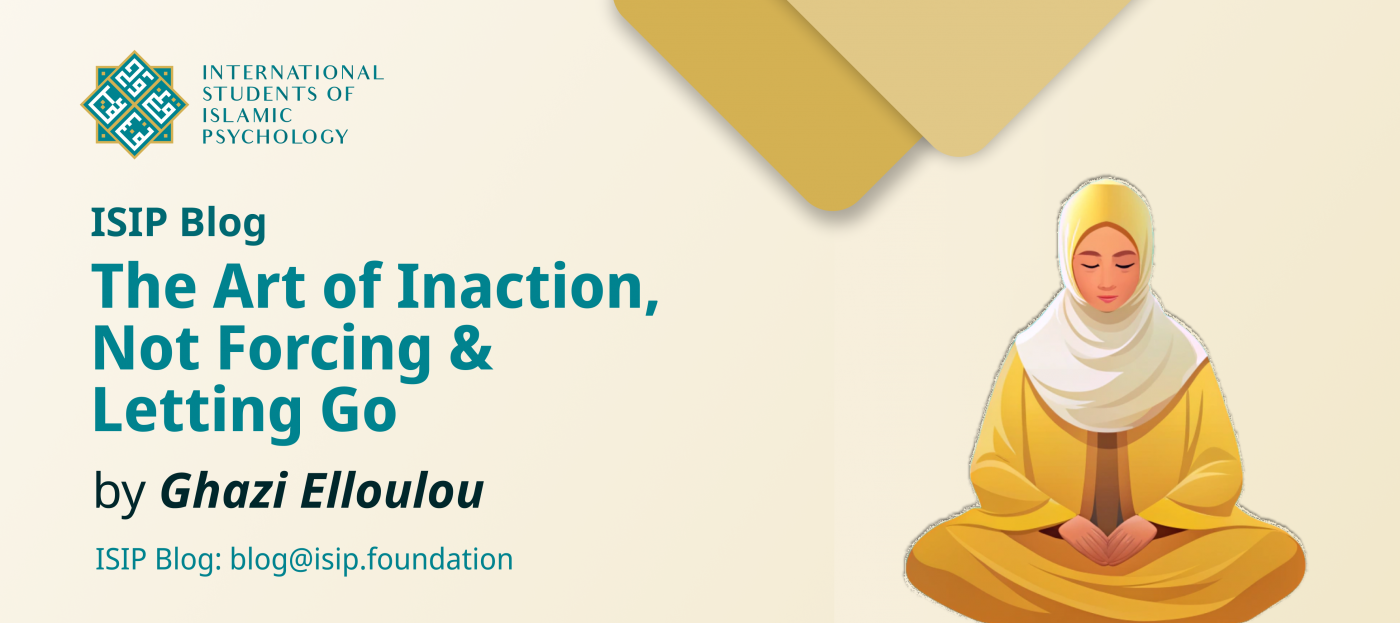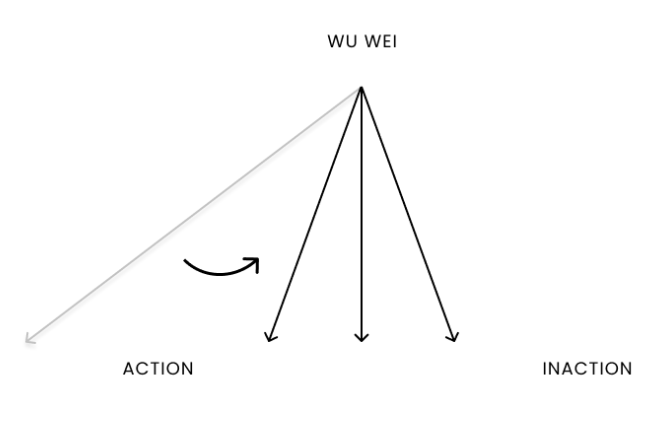
The hustle culture & self-help books are killing the human spirit.
In the past 30 years, a new culture has emerged.
One that constantly pushes people to take action, set goals and move forward.
This obsession with the constant pursuit of action has created inefficiencies.
It created burnout, the myth of multi-tasking, and the inability to disconnect.
While we might be busier than ever, we are not necessarily more productive.
The pendulum that has swung to relentless action needs some re-calibration.

The art of inaction doesn’t encourage staying in the comfort zone, but rather understanding that:
1) Not everything is in your control.
2) Patience and letting go is key, as most things naturally take time.
3) Excessive force is not only unnecessary but often fires back.
Think of a time when you tried to remember a name.
The more you tried to remember it, the more you couldn’t.
Then while doing the dishes, or walking in the supermarket, you suddenly remember it.
That is the art of not forcing.
The Chinese call it Wu Wei (effortless action).
A Muslim is an individual who lets go without fear and submits completely to god.
Even when things don’t go as planned, he trusts God’s plan.
Jesus said: “Unless you became again as a child, you can’t enter the kingdom of heaven.”
Children force nothing.
They cry when they feel like crying, they play when they feel like playing.
They accept it all, the good and the bad.
They flow with the tides of life.
The culture of always wanting to do/be more has created tension, and anxiety, and damaged the human spirit.
Ironically, the act of inaction brings more productivity and efficiency than, constant action.
A practical example of letting go in everyday life is:
1) Being at ease when things don’t go as planned.
2) Not trying to be someone else “just to fit in”.
3) Understanding that personal growth and change have their own pace.
4) Not constantly checking the response to an important email you have sent.
Working longer hours and constant effort doesn’t necessarily mean better results.
It’s about knowing when to lead and when to follow.
When to stir the ship, and when to let the winds guide you.
Many examples truly prove that sometimes less is more.
The 80/20 rule is one of them.
“When you’re feeling, you can’t force. When you’re forcing you can’t feel.” – MMA teacher
In life, the best performances you watch are those that feel effortless.
The most beautiful conversations are the ones you don’t seek.
The best romantic relationships are the ones that happen out of nowhere.
You don’t seek them.
They seek you.
You find yourself soaked in them without any effort that you completely lose sense of time.
Life isn’t always about you, & things won’t always go the way you want them to.
To accept that, and do nothing to change it, takes a weight off your shoulders.
To be content with where you are in life and what God has given you is one of the greatest blessings.
We usually create unnecessary misery when we don’t accept what we get in life.
We try to force what we want instead,
And that is when we end up not getting it.
We start by going into our heads, fighting with ourselves and then with the outer world.
There is no need for that.
Forcing moving forward, pushes you backwards.
It’s not always easy, but ideally:
1) Force nothing.
2) Trust God.
3) Let go.

An important post Allahumma barik. We need to balance the concept of changing ourself with acceptance. Especially when there is a lot of money in this self help buisness. It feels so easy to read self helping manuals, and still they might leave us in a feeling of anguish and emptyness. Did we forget to ask Allah of guidence? Did we forget to accept our circumstances? Did we think we are in power of change? Alhamdulillah our Rabb is the Guardian, the Sustainer and our Love How forgetful are we not, bani Adam. Alhamdulillah we remind eachother. Jazakillahu khayran <3
I love the last words in your blog, insh Allah I will keep then in mind.
Jazakallahu khairan for the thoughtful comment sister.
These self-help books portray that we are in control of everything. That we are in control and have the power to change. That we can become rich and make millions.
As my grandmother always says “there is poison in the sweet”. There is definitely some good strategies or benefits in some of the books. But the overall leads to exhaustion, sadness & anger.
These self-help books keep you in loops:
1) Thinking you are in control of everything.
2) Constantly thinking there is something wrong with you and trying to change yourself.
3) Not accepting where you are in life, what god has given to you, and always wanting more.
It is the perfect recipe for a depressed life.
While we can definitely take action, make duaa and persist in life, we can only get things if Allah blesses us with them. We stay humble and know, that “we are not that smart”, it is Allah that has blessed us.
May Allah give us guidance and wisdom to navigate through life.
Thanks for this wisdom of inaction. It reminds me this maxim “anything that gets to you is your portion and anything that passes you by is not your portion”.
Jazakallahu khairan brother for sharing this maxim. We constantly need reminders to be content and satisfied with what Allah has given to us.
As prof Khalid el Zamzamy said, “Let go and let God”
You’ve done an excellent job with this blog, and I believe your points resonate with the concept of action bias in psychology to some degree. However, I’d like to respectfully challenge the assertion that “children force nothing.” As a psychologist, and based on substantial clinical literature, I can confidently assert that children do exhibit behaviors that could be described as “forcing things.” This is a normal part of their development, particularly in the early stages when they are naturally egocentric.